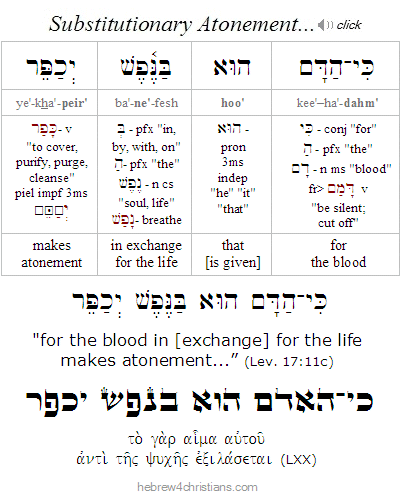|
In our Torah portion this week (parashat Bo) we read about the institution of Passover and the final plague that was to befall the Egyptians on the Passover night. When we think of this time, we may imagine God "passing over" those houses that had the blood of the lamb smeared on their doorposts, though it might better be said that God passed into the homes of those who trusted him, while he withdrew His Presence from those that did not...
To see this note that two different words are used that can be translated as "pass over." First, God said, "I will pass over (i.e., avar: עֲבַר) the land of Egypt that night, and I will strike all the firstborn in the land of Egypt, both man and beast; and on all the gods of Egypt I will execute judgments; I am the LORD" (Exod. 12:12). But directly after saying this, God promised to "pass over" (i.e., pasach: פָּסַח) the homes of those who trusted in him to impart his protection from the plague of death: "The blood shall be a sign for you, on the houses where you are. And when I see the blood, I will pass over to you (lit. עֲלֵכֶם, 'upon you'), and no plague will befall you to destroy you, when I strike the land of Egypt" (Exod. 12:13). In other words, when God would see the blood of the Passover lamb, he would pass over to enter the house and "cover" its occupants from the judgment of death.
The blood of the Passover lamb sheltered people from the plague of death by atoning for their sin by means of a substitutionary sacrifice. The Torah states that "the life (i.e., nefesh: נֶפֶשׁ, or 'soul') of the flesh is in the blood" (Lev. 17:11), and therefore death represents the separation of the soul from the body. The life blood of a sacrificial lamb was therefore offered in exchange for the death and destruction of others. Eating the lamb "roasted by fire" meant identifying with the death offered in exchange for your own; eating matzah, or unleavened bread, signified being delivered in haste, apart from the "rise of the flesh" or human design; and eating maror, or bitter herbs, recalled the bitterness of former bondage.
The very first time the word "blood" (דָּם) occurs in the Scriptures concerns the death of Abel, the son of Adam and Eve who was murdered by his brother Cain. After Abel's blood was shed, the LORD confronted Cain and said, "What have you done? The voice of your brother's blood (קוֹל דְּמֵי אָחִיךָ) is crying to me from the ground" (Gen. 4:10). Since blood is the carrier of life, it bears the energy and vitality of life: it has its own spiritual "voice." Likewise, the blood of Yeshua (דְּמֵי יֵשׁוּעַ), the true Lamb of God who died upon the cross, speaks on our behalf, and reverses the power of death by creating a barrier that death can no longer cross, since the death of the sacrificial victim "exchanges" the merit and power of life. Unlike the blood of Abel that "cries out" for justice, the blood of Yeshua cries out for mercy (Heb. 12:24). Putting our trust in the provision of God's sacrifice causes His wrath (or righteous judgment) to pass over while simultaneously extending love to the sinner.... This is the essential message of the gospel itself, that we have atonement through the sacrificial death, burial, and resurrection of Yeshua our Savior, the great Lamb of God. As Yeshua said, "I tell you the solemn truth, the one who hears my message and believes the One who sent me has eternal life (חַיֵּי עוֹלָם) and will not be condemned, but has passed over (i.e., μετά + βαίνω, lit., "crossed over" [עָבַר]) from death to life" (John 5:24). Just as God's judgment passes over from life to death on my behalf; so His love passes over from death to life on my behalf...
Notice that the Hebrew verb "pasach" can also mean "to limp," suggesting the heel of Messiah that was "bruised" in the battle for our salvation (Gen. 3:15). It is the cross of Yeshua that enables the mercy of God to "overcome" his justice, or that allows "steadfast love and faithfulness to meet; righteousness and peace to kiss" (Psalm 85:10). His attribute of Justice passes over us as His attribute of Compassion passes into us... The sacrifice of Messiah allows God to be both just and the justifier of those who trust in God's remedy and exchange for our sin (Rom. 3:26).
The idea of substitutionary atonement is surely mysterious and complicated, but ultimately the message is simple: God loves you and has made a way for you to be eternally accepted -- despite your sin... That's the "good news" of the cross. That's what Yeshua meant when he said, "Just as Moses lifted up the serpent in the wilderness, so must the Son of Man be lifted up, that whoever believes in him may have eternal life. For God so loved the world, that he gave his only Son, that whoever believes in him should not perish but have eternal life (חַיֵּי עוֹלָם). For God did not send his Son into the world to condemn the world, but in order that the world might be saved through him" (John 3:14-17). Humanity as a whole has been "bitten by the snake" and needs to be delivered from its deadly venom. Just as the image made in the likeness of the destroying snake was lifted up for Israel's healing, so the One made in the likeness of sinful flesh was to be lifted up as the Healer of the world (Rom. 8:3). All we need to do is look and believe. Yeshua died for you so you can live. He stands at the door and knocks, offering to cross over to give you his life (Rev. 3:20).
Hebrew Lesson
Leviticus 17:11 Hebrew reading (click):
|



